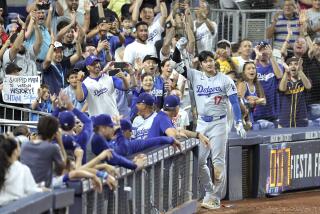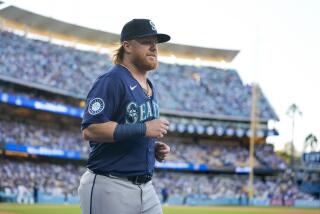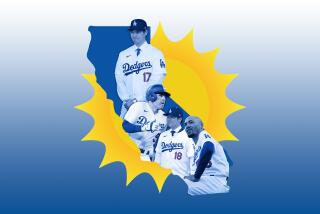NEW BRAVE WORLD : Tanner Has Been Run Out of Atlanta, and Even Murphy Doesn’t Seem the Same
- Share via
ATLANTA — When batting practice is over and he is done with the daily battery of interviews, Dale Murphy walks to a corner of the dugout at Atlanta Fulton County Stadium and patiently signs the baseballs, programs and scraps of paper thrust at him by eager fans.
Success has not spoiled Murphy, but has he been scarred by failure? Has the annual ineptitude of the Atlanta Braves finally broken Murphy’s back and bat?
General Manager Bobby Cox sat in his private box on the last day of May, pondering Murphy’s .207 batting average, 5 home runs and 13 runs batted in.
“It’s eating him inside,” Cox said of the responsibility Murphy shoulders. “He’s Mr. Baseball in the Southeast, in America really. He’s high-salaried, and it worries him. He’s not like a lot of high-salaried players. He cares.”
He cared enough to forsake the opportunity for free agency last winter and sign a three-year contract with the Braves, creating the impression that he is compassionate, masochistic or just plain loyal, which fits the apple-pie image.
“Look,” catcher Bruce Benedict said. “If the game was as easy as Murph has made it look over the years, everyone would raise their kids to be 6-7 and Mormon.
“He’s out there trying to do more than he’s capable of, trying to prove we’re not as bad as everyone says, and people should cut him a little slack, let him relax, have some fun. He’s played so well for so long, with no chinks in the armor, that it shouldn’t be a surprise if he becomes human for a month or two. He’s entitled to a slump. One a decade isn’t bad.”
Maybe it’s only that, a slump. Ten hits in the first six games of June offer evidence that Murphy will rise above the flames licking at Atlanta again and that he will eventually reach his normal 40-homer, 100-RBI heights, just as the Braves will ultimately sink to the depths of their normal 90 to 100 losses.
In the 11 years since Murphy arrived to stay, the Braves have finished better than .500 only three times and have changed managers five times. In the five years since they won the National League’s Western Division title in something of a fluke, opening the season with 13 straight wins on their way to a modest total of 89, the Braves have slipped to records of 88-74, 80-82, 66-96, 72-89 and 69-92.
The current 19-34 record, built on a season-opening losing streak of 10 games, projects to a 58-104 record and the most losses since 1935, when they were still in Boston and endured a club-record 115 defeats.
Unlike ‘82, there seems to be nothing of a fluke about it.
“To play .500, we’ll have to play our rears off,” new Manager Russ Nixon said.
Nixon replaced a fired Chuck Tanner on May 22 with the Braves at 12-27. They are 7-7 since and presumably playing their rears off.
“We don’t have the personnel to beat L.A. or Houston or San Francisco or Cincinnati,” Nixon said of the Western Division, in which the Braves are tied for last place. “We can compete with them for a series, but not a season. The players here are better than they’ve shown, but all I can promise is that we’ll try to get more out of them.”
Owner Ted Turner seems to have known that this would be another season without much promise. He attended six innings of the season opener against the Chicago Cubs and hasn’t been back.
Nixon says that of his current regulars, only three or four fit into the Braves’ future--presumably second baseman Ron Gant, 23; shortstop Andres Thomas, 24; right fielder Murphy, 32, and, perhaps, first baseman Gerald Perry, 27.
How did the Braves get into this mess?
The thing to remember is that they have basically been in it ever since moving to Atlanta in 1966. They have finished better than .500 only 8 times in the 22-plus years--only once consecutively--while employing 15 managers, among them Turner, who took over during a 17-game losing streak in 1977 and was asked by former Commissioner Bowie Kuhn to retire with an 0-1 record.
What is there to remember from more than two decades? Phil Niekro’s knuckler. Hank Aaron’s homers. Dale Murphy’s brilliance. Bob Horner’s injuries. Chief Nok-a-homa’s war dances. Turner’s eccentricities.
Skipper of the yacht Courageous, which won the 1977 America’s Cup, Captain Outrageous came into baseball in 1976, at the dawn of free agency. Andy Messersmith, the first of that breed, left the Dodgers to join Turner’s Braves.
Others followed. Claudell Washington, Al Hrabosky, Bruce Sutter, whose subsequent injury was a significant misfortune, among them. If a free agent couldn’t get the contract he wanted from Turner, he could count on the Braves to provide a wedge, helping his negotiations with Gene Autry or George Steinbrenner.
Turner caught lightning in a bottle in ‘82, when Niekro won 17 games, Gene Garber saved 30 and Horner and Murphy combined to hit 68 homers and drive in 206 runs. But the absence of left-handed pitching proved fatal in the playoffs with the St. Louis Cardinals and prompted Turner to sign free-agent left-handers Terry Forster and Pete Falcone during the winter, resulting in the loss of his Nos. 1 and 2 amateur draft choices as compensation.
In ‘83, with the Braves still in the race in August and the Dodgers just having traded for Rick Honeycutt of the Texas Rangers, Turner attempted to keep pace by making what proved to be a destructive deal, trading center fielder Brett Butler and promising third baseman Brook Jacoby to the Cleveland Indians for pitcher Len Barker, who went 1-3 as the Braves finished 3 games behind the Dodgers that year and 7-8 when they finished 12 behind in ’84.
Said a source close to the organization: “The Braves had seven or eight years there when Ted delivered a primer in how not to run an organization. It was leadership by committee. Ted had no real baseball man at the helm. He was only thinking of the club’s ratings on TBS (Turner Broadcasting System).”
Aside from the Barker trade, made partly on the Braves’ belief that they had a power-hitting phenom in third baseman Brad Komminsk, who never delivered and is now in the Milwaukee Brewers’ farm system, Turner:
--Traded left-hander Ken Dayley, now a quality relief pitcher, to the Cardinals for third baseman Ken Oberkfell, who has never driven in more than 50 runs in a season. Meanwhile, Jacoby has averaged almost 80 RBIs in his last three seasons with the Indians.
--Traded Brian Fisher, now a quality starting pitcher with the Pittsburgh Pirates, to the New York Yankees for journeyman catcher Rick Cerone.
--Released a number of pitchers who have made contributions elsewhere, including Pascual Perez, Bob Walk, Terry Leach, Larry McWilliams and Jeff Bittiger.
By the end of the 1985 season, which the Braves finished 29 games out, Turner seemed to have developed more interest in saving both humanity and his cable empire from reported financial problems than designing a winning team.
He hired Tanner as manager, former Atlanta and Toronto Blue Jay Manager Bobby Cox as general manager, and gave five-year contracts to both, authorizing the long-needed rebuilding project.
Attorney Stan Kasten, general manager of Turner’s Atlanta Hawks of the National Basketball Assn., became president of both the Hawks and Braves in ‘86, overseeing the business end.
Kasten cited Turner’s involvement with the Goodwill Games and Better World Society and said he is no longer involved in the daily operation of the Braves.
“He is still consulted on the most important decisions, but he has placed so much authority in Bobby and me that it would take unusual circumstances for him to overrule us,” Kasten said.
“He is still intently interested in the fate of his team, but he has now given us time to get the job done, and all the resources we need.”
Those resources are being put into prospects and minor league instruction rather than fringe free agents. Cox spent about $1.2 million signing his 1987 amateur draft choices. He has added two farm clubs and about a dozen scouts. The minor league cupboard was bare when he arrived.
“The Braves had been losing a lot of draft picks by signing free agents,” Cox said. “They were drafting low and not signing their draft picks. We had no other choice but to put a lot of money back into development. We’re committed to it.”
Cox said his commitment is to the stockpiling of young pitchers. He said it was the fastest route to respectability. Faced with no alternatives, the Braves are force-feeding three of their top pitching prospects--Tom Glavine, Chuck Cary and Kevin Coffman--by giving them their year of triple-A experience at the major league level.
Reflecting on his system’s current status and its potential impact on the Braves, Cox said: “For us to be really outstanding in pitching may take another two years, but once they all hit, we should be outstanding for the next 10 years. Now we need to concentrate on power. We don’t have enough, considering the (smaller) dimensions of our park.”
As with all clubs in a transitional period, the Braves are finding that rebuilding and winning are incompatible. In his two-plus seasons, Tanner was 153-208. Cox, Kasten and Turner decided to replace him after several days of meetings. Cox refused to specify the reasons, but there are apparently three:
--He was concerned about Tanner’s handling of the pitching staff and believed that the young pitchers were being misused.
--He believed Tanner’s coaches were incapable of providing instruction and fired Willie Stargell, Bob Skinner, Al Monchak and Tony Baritrome along with Tanner.
--He thought the clubhouse atmosphere was too loose.
“There was more to it than just being a last-place team,” veteran outfielder Ken Griffey said of that atmosphere. “The players could do almost anything they wanted. It was like a country club.”
Nixon has removed the clubhouse TV and restricted the use of radios and stereos. Any player who does not participate in pregame infield practice will not play in the game that follows.
The pitchers’ roles have been defined. There have been early workouts and postgame meetings in which players were chewed out as well as praised. Tanner was, is and has always been a Pollyanna. He believes that everything will work out just fine. Nixon believes in an honest day’s work and an honest opinion.
“My personality may be different than what they’re used to,” he said. “I’m an honest man. The attitude of the club wasn’t good. I’m determined it’s going to change.”
A journeyman catcher who coached for Sparky Anderson with Cincinnati’s Big Red Machine teams, Nixon replaced John McNamara as manager of the Reds on July 21, 1982. The rebuilding Reds were 34-58, went 27-43 over the rest of the season and won 74 games in 1983, tying the Texas Rangers as the most improved teams in the major leagues. Nixon was rewarded by being fired.
Bob Howsam had returned to Cincinnati as the general manager, replacing Dick Wagner, and wanted his own man as manager. He chose the militaristic Vern Rapp, who failed to last the season.
Nixon, in the meantime, came to Atlanta as a coach under Tanner in 1986 and ’87.
Appointed by Cox, he and Tanner were not close.
“They had their own group,” Nixon said of Tanner’s coaching clique. “I never felt part of it. Chuck called me aloof, and I guess that after a while I was.”
Tanner, who apparently thought Nixon was there to get his job, reportedly tried to fire him after the ’86 season. At the end of ‘87, Cox agreed to make a change, appointing Nixon manager of the Braves’ farm club in Greenville, S.C.
“We still have the same players, but I think we’ll be better players,” catcher Benedict said of Nixon’s rise to the job. “I think we’ll be more dedicated. I think we’ll play a better brand of baseball.”
Attitude is one thing, ability another. In this transitional period, Murphy still represents most of what ability the Braves have.
Can he salvage respectability for them or has the load become too heavy? How long can he hit 44 homers, as he did last year, with no protection behind him, chasing bad pitches as he did in April and May?
“Anytime you look for external reasons for not hitting, you’re pretty much looking for a crutch,” he said. “I’ve gone through it all before, the contract, the losses, the change of managers, and I’ve pretty much learned that when I’m not hitting, it’s me, period.”
Nevertheless, there have been periodic lapses in concentration, and Dale Murphy, still the brightest of the Braves, said:
“There’s a fine line between being concerned about it and worrying about it, and I’m the first to admit that I probably think about it to the extent that it’s detrimental. People consider me something of an unemotional player, but they don’t know how emotional I really am, how badly I want to win.
“It’s like one of the guys said, ‘It would be great if you could cut your head off and just go out and let your body play.’ But the mental part is the challenge every player has to live with. It’s just doubly frustrating and doubly tough when the team isn’t doing well.”
Even when that’s almost all you’ve ever known.
More to Read
Go beyond the scoreboard
Get the latest on L.A.'s teams in the daily Sports Report newsletter.
You may occasionally receive promotional content from the Los Angeles Times.










